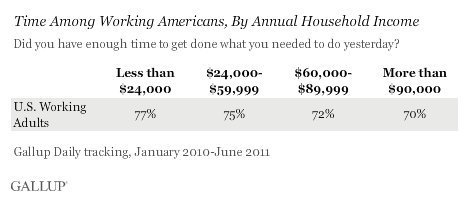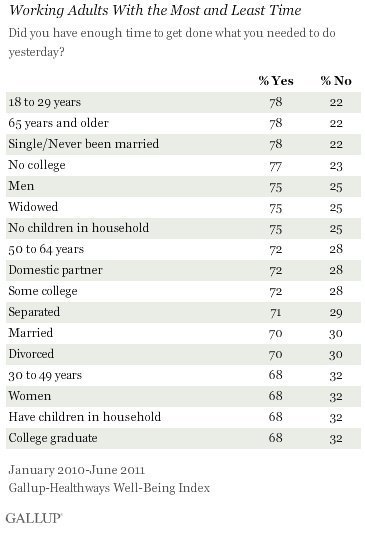A new Gallup poll has attached data to something many Americans have long felt in their gut: Most days are too short to accomodate the overwhelming demands on people's time, resulting in elevated levels of stress.
In fact, nearly three in ten working adults, or 28 percent, say they do not have enough time to in the day to complete their desired tasks, according to the poll.
That lack of time appears to be taking its toll. Of those working adults surveyed, 62 percent of those reporting a lack of time said they "experienced a lot of stress yesterday." That number falls to 33 percent among those that say they had enough time to complete desired tasks.
But it's not low-income Americans that are reporting the most time-related stress. Indeed, Gallup finds the percentage saying they have enough time in the day decreases as income increases:

Outside the Gallup Poll, most studies of work and family have found that people experiencing the greatest stress tend to be those with too much work and those who don't have enough, said Heather M. Helms, an associate professor at the University of North Carolina Greensboro.
"White-collar workers are putting in a long work week," said Helms, who studies marriage and families in the context of work and other social forces. "But I would be cautious about saying that the low-income worker is not stressed. Low-income workers often have other challenges on their plate that can require all sorts of very stressful gymnastics."
When the answers of working U.S. adults are broken down by demographic group, those feeling the most pressure include women, college graduates, those with children in the household, and those 30 to 49 years old. Notable is the discrepancy between the self-described busyness of women (32 percent) and men (25 percent).
This male-female discrepancy might be explained by the fact that women spend more time cooking, caring for children, helping with homework, cleaning and grocery shopping than their working male spouses, according to the Bureau of Labor Statistic’s most recent look at how working adults spend their time. On top of that, women also spend less time on stress-relieving activities, such as exercise.
That said, in marriages where both partners work, husands do report getting less sleep than wives. Married men are also taking on a larger share of the housework, when compared with forty years ago.
The poll results were based on telephone interviews with a random sample of more than 300,000 adults in all 50 states and the District of Columbia. The interviews were conducted between January and June.
See how Gallup breaks down busyness of working adults by demographic group:
